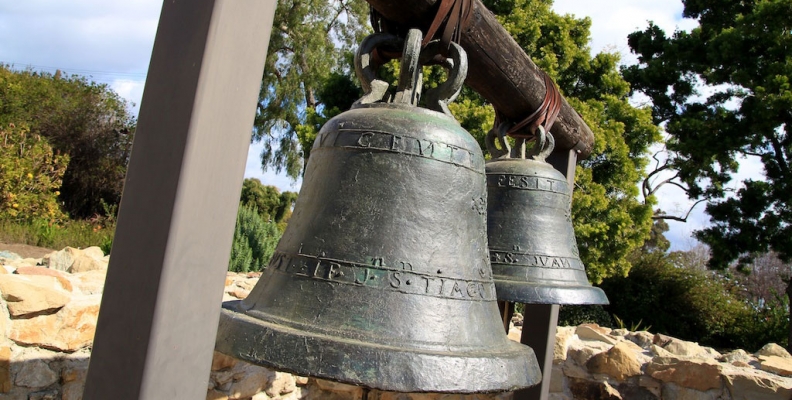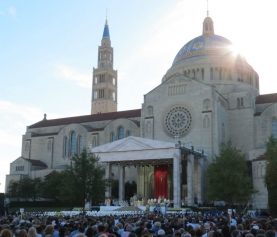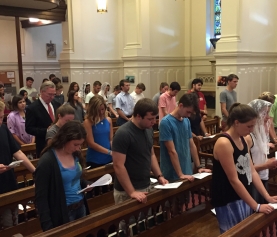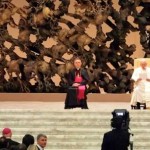
Blessed Junípero Serra and the Bell of Freedom
Sometimes called “The Apostle of California,” Blessed Junípero Serra was once a successful university professor of theology in Majorca who was struggling with a secret, burning desire: he was on fire with missionary zeal for the Gospel. The small-statured academic Franciscan friar found himself comfortably ensconced at the intellectual center of his culture, but at the same time he felt an enormous, inexorable pull to proclaim the Gospel to those “at the peripheries” of the world who had not yet encountered Christ.
One day former classmate and fellow Franciscan Friar Francisco Palou approached Junípero with the same burning desire, and a plan to make a great missionary to “New Spain” (what is now Mexico). When his confrere asked the learned professor, unaware of his own secret longing, to accompany him on the journey, Fray Junípero wept tears of joy. Together they had the courage to go to the peripheries of a new world to conform themselves more fully to God’s will, to preach the Gospel, and in doing so bring every soul to Christ.
When in Mexico, Junípero gained a reputation for preaching even when no one was around. At Mission San Antonio, the small brown-habited friar was once spotted ringing a great bell that hung from a tall tree, shouting: “Come you pagans; come, come to the Holy Church; come, come to receive the Faith of Jesus Christ.”
When one of his confreres found him, he kindly pointed out that there wasn’t a pagan in sight. Quizzically he asked, “We haven’t even built the church yet? Isn’t the bell ringing a bit much? A bit pointless?” Fray Junípero answered joyfully, “[A]llow my overflowing heart to express itself!” And added, “I wish this bell could be heard throughout the world … or at least by every pagan who inhabits this sierra.” For Junípero, it was the bell of freedom, the bell that called the world to know and love the source of all happiness and joy in Jesus Christ.
Junípero Serra never stopped ringing that bell.
For nine years with the Pame Indians he rang that bell by learning their language — with which he would preach the Gospel of Jesus Christ to them — and by teaching the natives agricultural skills — with which they could grow the wheat to make the bread that he would consecrate in the Holy Eucharist.
In 1767 he was asked to ring that bell in Baja California, overseeing 13 missions there that had been established by Jesuits but then abandoned when they were recalled to Spain. Very soon after arriving in Baja California, however, a new Spanish plan was conceived for Alta California. This would entail a two-pronged endeavor, combining colonization and conversion. The new plan was to colonize the new territory and spread the Christian faith to its pagan inhabitants. Junípero Serra was asked to help with the latter. He was sent to the northernmost mission, San Diego, in 1769.
Dotted along the coast of California today, like beads of the rosary he prayed, remain the 21 missions he founded successively from 1770 to 1782. Even before the New England colonists declared their independence from another imperial power, Californians were turning towards Christ — and they were doing so because a small-statured theology professor rang that other liberty bell, which shouts in the public square, “Come to the Holy Church! Come to receive the Faith of Jesus Christ!” For this freedom is not simply the freedom from the tyranny of evil, but freedom for the highest Good: to know and love God with all your heart, soul and mind, and your neighbor as yourself.
Blessed Serra wasn’t perfect. He was well aware of his own limitations, imperfections, and failings. In truth, and in humility, Serra wrote, “There is no reason why my name should be mentioned, except for the blunders I may have committed in doing the work.”
But the Church does not remember his name because of his blunders. We remember his name because his heart was overflowing with a zeal for Christ that did not count the cost and a love of his neighbor’s soul that looked not upon borders. On Sept. 23, 2015, Pope Francis, as supreme pontiff, will canonize him as Saint Junípero Serra, with a holy confidence that his life itself is a kind of bell, which rings for our highest freedom, the freedom of eternal life.
— Chad Pecknold is an associate professor of systematic theology at The Catholic University of America School of Theology and Religious Studies.








